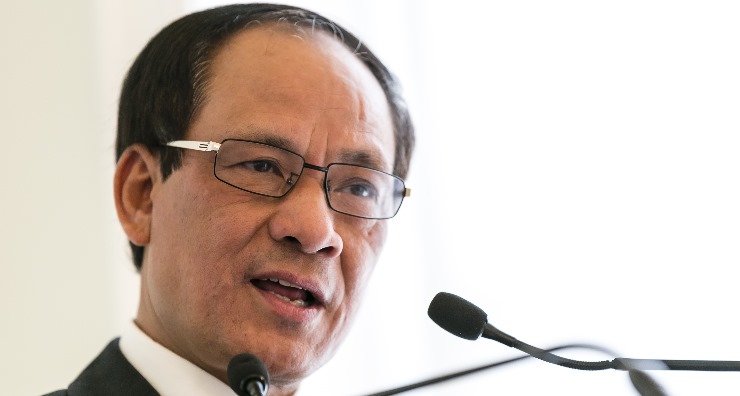Driving commercial and political engagement between Asia, the Middle East and Europe
Driving commercial and political engagement between Asia, the Middle East and Europe
Driving commercial and political engagement between Asia, the Middle East and Europe

ASEAN’s Secretary-General HE Le Luong Minh is hopeful that a free trade agreement between the 10-member bloc and the European Union will be negotiated soon, deepening economic and political ties between the two regions.
In an interview with Asia House following a private briefing to corporate members on 12 September, the Secretary-General said: “Among ASEAN countries we have a consensus and we have agreed with the EU and the EU has agreed with ASEAN that the negotiations will be resumed by the end of 2015 following the launch of the ASEAN Economic Community.”
The EU is ASEAN’s second largest trading partner after China, with trade between the two groupings climbing to US$246.2 billion in 2013, up from US$242.6 billion the previous year. ASEAN is the EU’s third largest trading partner outside Europe after the United States and China.
A stronger partnership with ASEAN, which comprises Brunei, Cambodia, Indonesia, Laos, Malaysia, Myanmar, Philippines, Singapore, Thailand and Vietnam, would enable the EU to tap into one of the world’s fastest growing regions, Minh said. ASEAN’s GDP of US$2.4 trillion – making it one of the world’s ten biggest economies – is expected to reach US$10 trillion by 2030.
With a total population of more than 625 million and an expanding middle class, the region is an increasingly attractive destination for EU investors. The EU was the largest source of foreign direct investment inflows to ASEAN in 2013, representing 22 per cent of the US$122 billion in inflows it received that year. Between 2005 and 2012, EU companies invested an average €13.6 billion (US$17.6 billion) annually in ASEAN countries, according to the European Commission.
The EU and ASEAN launched negotiations for a free trade agreement in 2007 but they collapsed two years later, partly due to EU concerns about uneven economic development among ASEAN member states.
The EU concluded a free trade agreement with Singapore, ASEAN’s most developed economy, in 2012 and is also negotiating similar agreements with Malaysia, Vietnam and Thailand.
Despite the region’s growing importance to Western investors and exporters, there are doubts within the business community about ASEAN’s ambitions to achieve economic integration. Some investors question whether a 2015 deadline for the formation of an ASEAN Economic Community is realistic and cite barriers such as increasing nationalism in Indonesia, the bloc’s biggest member, slow progress in dismantling non-tariff barriers and China’s economic influence on key economies.
Member states’ failure to adequately invest in infrastructure could also impede GDP growth. According to a report by McKinsey & Company for the CIMB ASEAN Research Institute (CARI), ASEAN countries will have to invest at least $2.4 trillion in infrastructure from 2013 to 2030 to maintain the benchmark infrastructure stock of around 70 per cent of GDP. Historically, countries have spent an average of three per cent of GDP on infrastructure each year, slightly below the global average of 3.8 per cent.
In the interview, Minh also spoke about the opening up of Myanmar, which is chairing ASEAN this year for the first time since it joined the bloc in 1997.
“Since reforms were introduced leading to the lifting of most of the sanctions by Western countries, the country has been progressing very well and the process of reform and democratisation in Myanmar has been going very well,” he said. “It’s enabled Myanmar to play a very constructive and effective role in ASEAN.”
However, he said Myanmar still faced challenges and would need assistance in narrowing the gap in economic development with its ASEAN peers.
“The challenge is that while it is opening up…and that attracts much interest and engagement from the outside world, the country after many years of isolation is suffering from the shortage of resources and human capacity to carry on the process of economic development and integration and they need a lot of help in capacity building,” Minh said.
He added: “We believe in the future of Myanmar, in the future of its democratisation and reform process. At the same time ASEAN is ready to extend to Myanmar whatever assistance or support necessary.”
Minh is ASEAN Secretary-General for the fixed term of 2013-2017. He was previously Vietnam’s deputy minister for foreign affairs and also served as the country’s permanent representative to the United Nations.
Minh, a native of Vietnam, visited Asia House on 11 September for the ASEAN Insights Conference and also addressed a private breakfast briefing exclusively for Asia House corporate members on 12 September. The breakfast briefing, which was held under the Chatham House Rule, covered security challenges in South East Asia, the investment climate for insurance companies and law firms in ASEAN, banking regulations and investment in Myanmar.
Tosin Sulaiman is a freelance business journalist working for Asia House.
Have you considered becoming a corporate member of Asia House? To find out more about the benefits click here.
